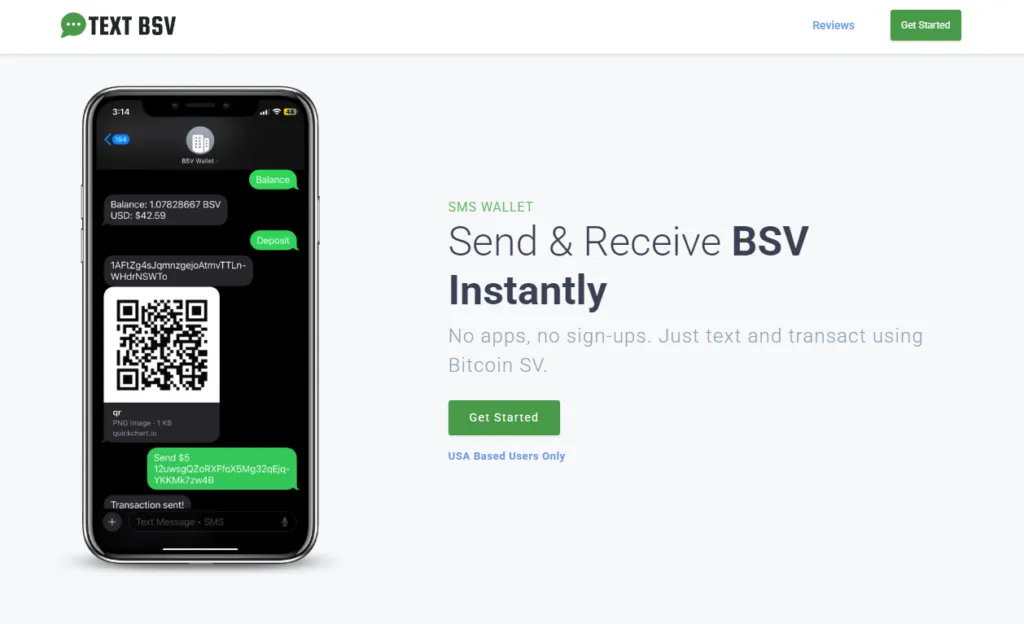|
Getting your Trinity Audio player ready...
|
Sending satoshis via SMS/text messages is quick, simple, and a great way to onboard new users. The recipient doesn’t need to download or register for anything—in fact, it doesn’t even matter if they’ve never heard of Bitcoin before. With TextBSV, you only need a mobile phone number to make small P2P payments. You’ll also need a phone, but it doesn’t need to be a smartphone.

TextBSV is the latest project from Money Game Ventures’ Dan Wagner, a former professional baseball player and co-founder of the popular BSV-based gaming platform Haste Arcade. It’s currently inviting U.S.-based users to test it out:
Though TextBSV is new, the idea behind it isn’t. There have been a few attempts in years past, but like so many other Bitcoin applications aimed at small casual transactions, they eventually fell foul of BTC’s scaling limits and transaction fees. There have also been issues with the requirements of external parties and other middleman services involved.
“The idea is simple. Everyone has SMS, which means they already have a Bitcoin wallet,” Wagner told CoinGeek. “It’s a play on an old concept from the BCH days with (Vin Armani’s) ‘CoinText,’ which I always found to be one of the best onboarding tools. If you know someone’s phone number, you can send them Bitcoin without any additional action on their part.”
TextBSV could be the spiritual successor to CoinText (which used the BCH network), but it is not a resurrection of that company—Armani has never been a BSV fan. It may also succeed by learning from some of CoinText’s problems. Wagner said there would be no venture capitalists or middlemen, and there wouldn’t be an app to download—whether independently or based on any existing messenger platform.
“It’s peer-to-peer cash, pure and simple. It should be easy both for regular users and for those who’ve never held Bitcoin before in their lives.”
Built for users, funded by donations
Even TextBSV’s funding model is simple: operating costs will be covered by voluntary donations from its users. Anyone who likes the service and finds it useful may also want to sling some sats to Wagner and his development team to keep it running.
“The idea is for the community and sponsors to fund the underlying costs of sending programmatic SMS so that end users can always use the service for free,” he said.
Instructions on how to get started with TextBSV are on the project’s homepage, although it’s only available to SMS users in the United States for now. Users send an initial text message to the number provided, fund their own wallet, and they’re good to go. There are no fees or costs to use the service (although they’ll still need to pay their mobile providers’ per-SMS charge).
“If you have to download an app it’s too much for a simple share of the tech. I don’t expect, nor would I suggest, users storing a lot of funds or using it as a primary wallet. That’s not the point. It’s about sharing P2P cash.”
But will the donationware model be enough? Wagner thinks so. “As it relates to funding and supporting the service, BSV proponents will fund it because they think it’s an important service, or they won’t,” he said.
“I’m doing this because I care about the ecosystem, and I’m incentivized to see it grow.”
By the way, whatever happened to CoinText?
Entrepreneur Vin Armani and his partners built CoinText in 2017 with similar goals: keep it simple and cheap, allow easy onboarding of Bitcoin newcomers, and be as close as possible to P2P cash transfers.
According to Armani, CoinText was a great success. The company secured VC backing from Yeomans Capital and launched a beta version in 4-5 countries, which soon spread to at least 45. The trial service was popular in regions with high mobile phone penetration but where smartphones and internet access hadn’t yet proliferated (including Ghana and South Sudan).
Cointext was “the first time you could actually push (crypto) to people,” Armani said, by generating Bitcoin private/public key pairs from ordinary phone numbers.
Its problems arose when the financial backers at Yeomans decided CoinText should become a WhatsApp-based application, which came with additional requirements from parent company Facebook (today’s Meta [NASDAQ: META]). At that time, Facebook was attempting to launch its own permissioned digital stablecoin, Libra, and also wanted to have a monopoly on that market. It decided that no other financial or money transfer apps should exist on its platforms, which essentially killed CoinText the week before its main launch.
Libra itself (later renamed Diem) ran into a brick wall of financial regulators from the U.S., European Union (EU), and others who claimed concerns over monetary sovereignty, privacy, antitrust, and financial stability. Meta shut down the Libra/Diem project in January 2022.
Though Armani was pleased with what CoinText achieved in its beta phase and still likes the idea, he has no plans to return the service. Though he never sold off the company’s assets, he said the SMS method isn’t as necessary these days—smartphones and mobile internet access are far more common in the 2020s.
Armani may have a point, but the response to TextBSV so far shows there is still demand for SMS-based payments on Bitcoin. No matter how great native BSV apps get or how easy they are to use, sending sats to non-Bitcoiners still isn’t an option. TextBSV overcomes that barrier by letting its users onboard anybody with a phone number. It isn’t trying to be fancy, and it doesn’t need to be. Keeping it simple and low-key may succeed where others didn’t.
Watch: How Digital Product Passports changes the way we trust brands

 08-21-2025
08-21-2025 





